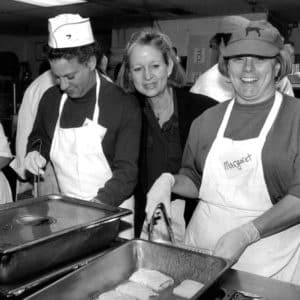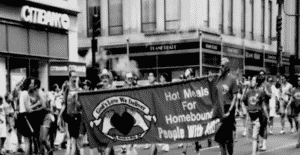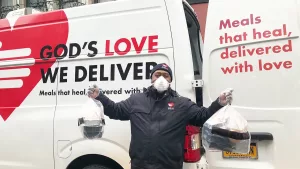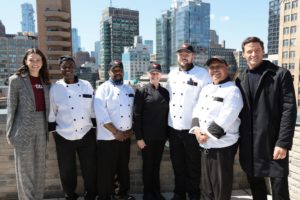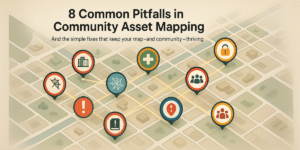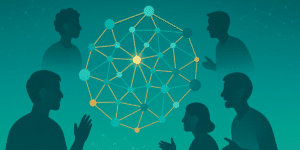How a NYC Charity Built a Network of Help in the Early Days of the AIDS Epidemic

Throughout PRIDE month, and all year, we at Visible Network Labs honor, celebrate, and recognize LGBTQ+ icons, allies, and those in our communities who helped make the world a more open and welcoming place for all. It is important to remember that so many have played difficult, seminal roles in uplifting LGBTQ+ voices throughout history.
The Beginning
With a name like God’s Love We Deliver, it’s natural to conclude that the charitable organization has a religious connection. Not so, according to Ganga Stone, the group’s founder, who passed away in 2021. Her belief in God did play a large role in Ms. Stone’s life, and a 1993 New York Times profile piece gave some clarification: “… Ms. Stone is on a mission. “Service to God” is how she describes it. By God, she means Jesus, Buddha, Allah, Siva, the Eternal, the individual spirit.”
The charity was born from Ms. Stone’s experiences as a volunteer at the Cabrini Hospice on Manhattan’s Lower East Side. Regularly, she and other volunteers brought packages of groceries to people in need in the area. One day in 1985, she brought groceries to a man named Richard Sale, a gay man in his early thirties whose health was in rapid decline due to the onset of AIDS – a disease which at the time was cloaked in mystery, fear, and discrimination. As she tried to hand him the package, it fell to the floor. He was no longer strong enough to cook his own meals.
Finding a Purpose
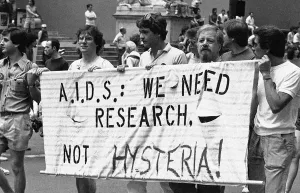
Protesting for more funding and research on AIDS during the 14th annual Lesbian and Gay Pride parade in New York in 1983.
Realizing that what Mr. Sale needed was actually hot, prepared food, Ms. Stone quickly galvanized a pre-internet network to help him: “She picked up his telephone book and found seven friends who agreed to bring him a hot meal once a week. By the time she got home, she had discovered her purpose.” Stone brought her roommate, Jane Ellen Best, on board, and the two delivered food on bikes throughout Manhattan, food that came from an ever-developing network of restaurants supporting the mission.
As the organization grew, it remained focused on a specific need. In the mid 1980’s, even in a diverse and cosmopolitan city like New York, AIDS was new, mysterious, and 100% fatal. Fear and lack of information led to many falsehoods regarding how it was transmitted and its effects, causing further prejudice, discrimination, even vitriol and an increase in violence against gay people. These negative reactions led to limited dialogue, research, and dissemination of information on HIV/AIDS, allowing it to spread more widely. Cities like New York with large LGBTQ+ populations were hit hard by the growing epidemic. The toll was evident to Ganga Stone – in the organization’s first formal year of operation, 400 of their clients passed away.
Bringing Meals and Light
God’s Love We Deliver began tapping into networks of people, often gay men, who were living with the disease in order to find out how they could help. Due to the still somewhat “underground” nature of LGBTQ+ culture at the time, it wasn’t always easy. But as the organization became more aligned and well-known throughout the community, they were able to make real, sizeable impacts: A 1987 New York Times article describes the experience that a man named Arthur Levy, who was suffering from AIDS, in addition to cancer and pneumonia – both common in AIDS patients at the time – had with the organization.
The spring before the article’s publication, Mr. Levy wasn’t sure he was going to live much longer, and wasn’t sure that he wanted to. But upon hearing about the organization, he decided to give it a shot. ”I know it sounds melodramatic,” said Mr. Levy, ”but this agency really changed my whole perspective.” While he enjoyed the meals that they brought, the folks that delivered the food provided a little extra: ”Here you get these total strangers coming in, laughing and telling jokes,” he said. ”I stopped feeling sorry for myself. I started creating a life from a vacuum. I decided I wanted to survive.”
Galvanizing Networks for Good
God’s Love We Deliver wasn’t serving just any kind of meals to those dealing with HIV/AIDS. They understood that many living with the disease can have a wavering appetite, so they made every effort to provide flavorful, high quality meals that resembled offerings from New York’s eclectic culinary scene: “Duck pate, swordfish kebabs, basmati rice, red cabbage salad and baked stuffed apple.” Variations were provided, like more or less flavorful dishes, savory soups, and pureed foods for those who had trouble swallowing.
The meals, the kitchens they came from, and the way they were transported are all a product of leveraging networks for good – the food and ingredients came from local restaurants, many of them gourmet, the kitchen space used to make meals was donated by the West Park Presbyterian Church on Manhattan’s Upper West Side, some of the financing received came from the New York State Health Department, a walk-in cooler was given by the Gay Men’s Chorus, and funds for a new delivery van came from then-Manhattan Borough President David Dinkins, who later became Mayor of the City.
2022: Continuing the Mission
In 2022, God’s Love We Deliver delivered the organization’s 30 millionth meal, accompanied by the actors Hugh Jackman and Sutton Foster. Each weekday, the organization delivers over 10,000 meals across New York City and its suburbs, with 72% of their clients over the age of 60, and 13% of their clients living with HIV/AIDS.
Ms. Stone retired as the Executive Director of the organization in 1995, writing a book, parenting, and living in Saratoga Springs, NY, until her death in 2021. She spread joy, acceptance, and meals, all through a charity that she acknowledged had a unique name: “Some people,” she said in the 1987 New York Times article, “are put off by the name God’s Love We Deliver.” But she has stayed with it because it struck her as funny and appropriate. ”We mean, God is love,” she said. ”You know, the kind of love you don’t have to earn. The kind your mother gave you.”
About the Author: Will Jacobson
Will is the Marketing Intern at VNL, and he joined the company in October 2021. Originally from New York City, Will loves Colorado and all the outdoor life it has to offer. He is also a pretty big foodie! Will assists in content creation, marketing, and communications for VNL. He is finishing up his degree in marketing from the University of Colorado Denver.
